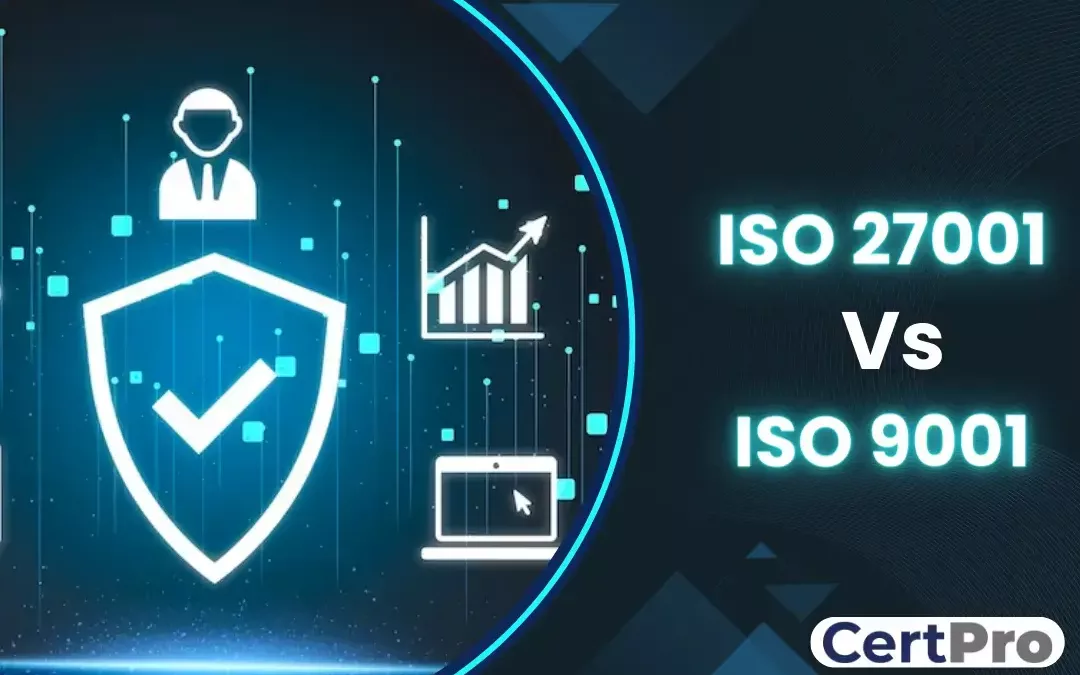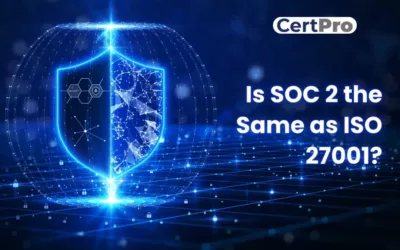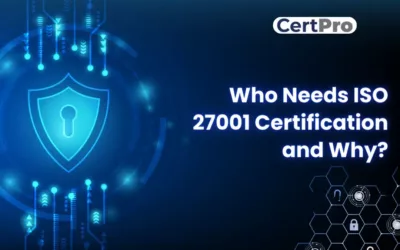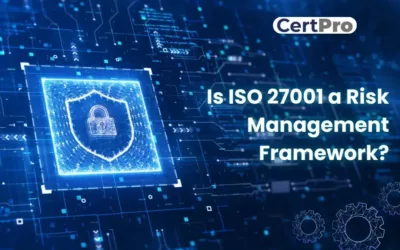In today’s business environment, quality management and information security are two critical aspects that organizations need to prioritize to stay competitive and secure. ISO 9001 and ISO 27001 are two globally recognized standards that provide a framework for achieving excellence in quality management and information security management, respectively. While there are similarities between these two standards, they have distinct differences in their scope, focus, and requirements. In this article, we will delve into the differences between ISO 9001 and ISO 27001 and explore the integration possibilities of these standards to help organizations achieve their quality and security objectives.
ISO 27001 vs. ISO 9001
ISO 9001 is a globally recognized standard that outlines the requirements for a quality management system (QMS) that enables organizations to consistently meet customer needs and improve their internal processes. The standard focuses on a process-based approach to quality management, emphasizing the need for continual improvement, risk management, and customer satisfaction. Organizations that implement ISO 9001 can benefit from increased efficiency, enhanced customer satisfaction, and improved reputation. ISO 9001 applies to organizations of all sizes and types, in both the public and private sectors.
On the other hand, ISO 27001 is a globally recognized standard that outlines the requirements for an information security management system (ISMS) that enables organizations to protect their sensitive and confidential information from threats and vulnerabilities. The standard provides a systematic approach to identifying, assessing, and managing information security risks by implementing a range of security controls and measures. It also emphasizes the need for continual improvement, monitoring, and reviewing of the security management system to ensure its effectiveness. Organizations that implement ISO 27001 can benefit from enhanced information security, improved risk management, and increased customer confidence. ISO 27001 applies to organizations of all sizes and types, in both the public and private sectors.
How is ISO 9001 different from ISO 27001?
The main differences between ISO 9001 and ISO 27001 are as follows:
1. Scope: ISO 9001 focuses on quality management and aims to help organizations consistently meet customer and regulatory requirements by improving their internal processes. It provides a framework for organizations to identify and mitigate risks and opportunities that can impact their operations and customers. ISO 27001, on the other hand, focuses on information security management and aims to help organizations protect their sensitive and confidential information from threats and vulnerabilities.
2. Objectives: The main objective of ISO 9001 is to improve customer satisfaction and organizational efficiency through a process-based approach to quality management. It emphasizes the need for continual improvement, risk management, and customer satisfaction. ISO 27001, on the other hand, aims to protect sensitive information from unauthorized access, disclosure, or destruction. It emphasizes the need for risk assessment, the implementation of security controls, continual improvement, and monitoring of the security management system.
3. Requirements: ISO 9001 requires organizations to meet customer and regulatory requirements by improving their internal processes. The standard provides a set of guidelines for organizations to follow to ensure they consistently meet customer needs and improve customer satisfaction. ISO 27001, on the other hand, requires organizations to comply with legal, regulatory, and contractual requirements related to information security. The standard provides a set of security controls and measures that organizations need to implement to protect their information assets.
4. Controls: ISO 9001 emphasizes a process-based approach and continual improvement. The standard provides a framework for organizations to identify and mitigate risks and opportunities that can impact their operations and customers. ISO 27001, on the other hand, requires the implementation of specific security controls and measures to mitigate risks and vulnerabilities. The standard provides a set of controls that organizations need to implement to protect their information assets.
The integration of ISO 9001 and ISO 27001 standards
Despite their differences, ISO 9001 and ISO 27001 can be integrated to achieve better results. By integrating these standards, organizations can ensure that their quality management and information security systems work seamlessly together to improve overall organizational performance. You can achieve integration by:
- Identifying common processes: Organizations can identify the processes that are common to both quality management and information security management and integrate them into a single system.
- Implementing an Integrated Management System (IMS): An IMS is a single system that combines multiple management systems, including quality management and information security management, into one cohesive system.
- Conducting a Risk Assessment: Organizations can conduct a joint risk assessment to identify risks and opportunities related to quality management and information security management and develop a single set of controls to mitigate them.
The benefit of integrating ISO 9001 and ISO 27001
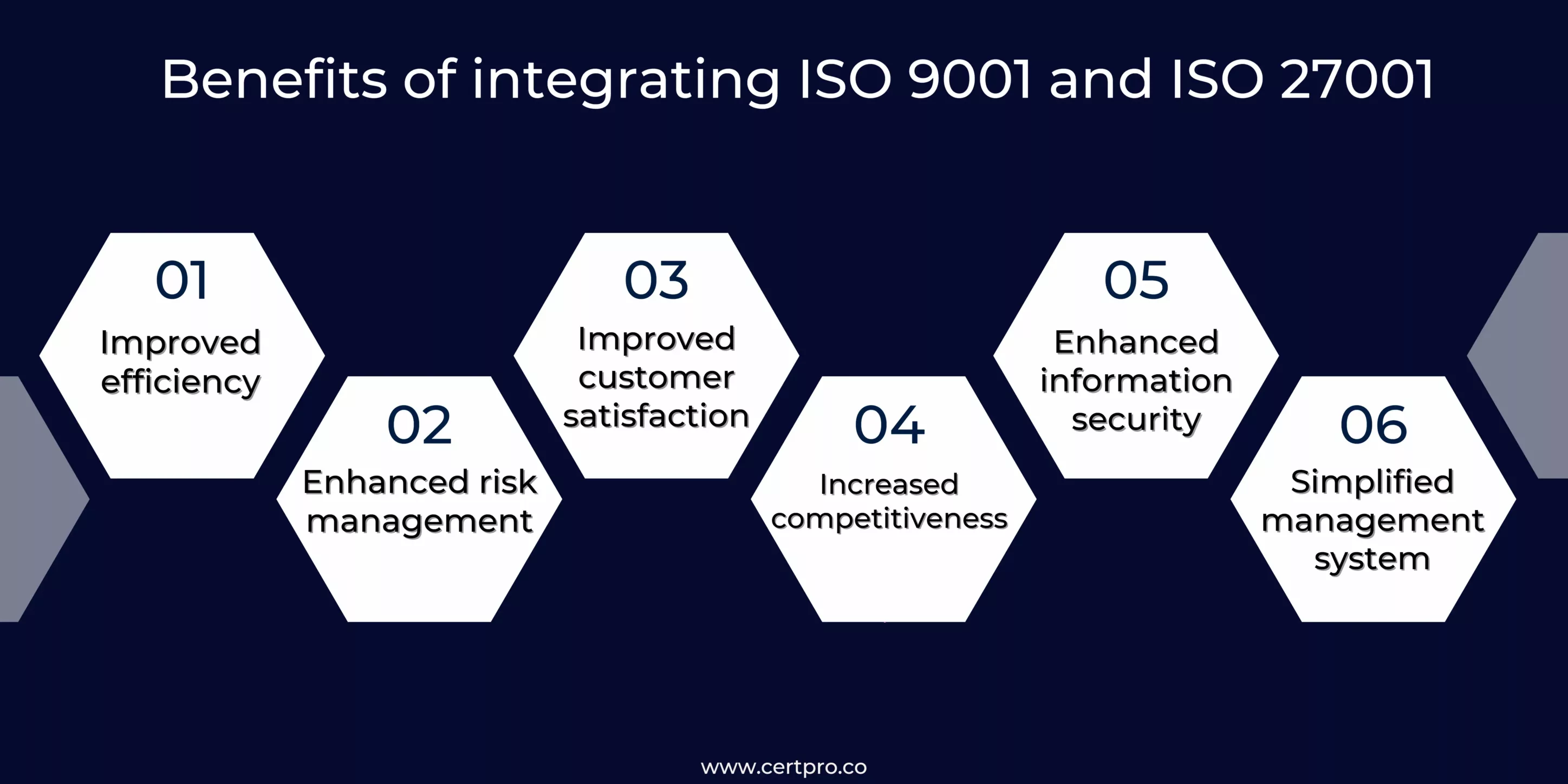
Integrating ISO 9001 and ISO 27001 can provide several benefits to organizations, such as:
- Improved efficiency: Integrating the two standards can help organizations identify common processes and eliminate duplication of effort. This may lead to increased efficiency and reduced costs.
- Enhanced risk management: An integrated management system (IMS) can provide a holistic view of risks and opportunities related to both quality management and information security management. This can help organizations better identify, assess, and mitigate risks.
- Improved customer satisfaction: An IMS can ensure that customer requirements related to both quality management and information security management are met consistently. Improved retention and satisfaction with customers could result from this.
- Increased competitiveness: An IMS can help organizations differentiate themselves from competitors by demonstrating their commitment to quality management and information security management.
- Enhanced information security: Integrating ISO 9001 and ISO 27001 can help organizations implement a more comprehensive information security management system that is aligned with their quality management system. This can result in enhanced information security and a reduced risk of data breaches.
- Simplified management system: An IMS can simplify the management system by reducing the number of procedures, policies, and documents required. This can result in a more streamlined and efficient management system.
Finally, integrating ISO 9001 and ISO 27001 can provide several benefits to organizations, such as improved efficiency, enhanced risk management, improved customer satisfaction, increased competitiveness, enhanced information security, and a simplified management system. It is important for organizations to carefully plan and implement an IMS to ensure that the benefits are realized.
Achieve international standards with CertPro’s expertise
CertPro is a prominent auditing and management consulting firm that provides bespoke services to businesses globally, such as ISO 27001 and ISO 9001 certification. With a team of highly skilled auditors and consultants, CertPro extends extensive assistance throughout the certification process, ensuring adherence to international standards for information security and quality management. CertPro’s approach is to meet the specific demands and prerequisites of each client, including pre-assessment, gap analysis, documentation review, and training. By collaborating with CertPro, businesses can capitalize on their proficiency and acquire certification confidently, receiving top-notch services that are cost-efficient, effective, and customized to their preferences. CertPro is dedicated to helping businesses elevate their operations, augment their competitiveness, and accomplish their strategic objectives by certifying ISO 27001 and ISO 9001.
FAQ
What is the difference between an information security policy and an information security program?
An information security policy (ISP) is a set of rules and guidelines that an organization establishes to govern the use and protection of its information assets. An information security program (ISP), on the other hand, is a comprehensive and ongoing process that includes the development, implementation, and maintenance of information security policies, procedures, and practices to protect an organization’s information assets. The ISP is the operational implementation of those policies and guidelines.
What are the consequences of not having an effective information security policy?
The consequences of not having an effective information security policy can be severe. It may lead to unauthorized access to sensitive information, loss of data, damage to the organization’s reputation, legal and regulatory compliance issues, financial losses, and disruption to business operations. This can have far-reaching consequences, including loss of revenue, loss of customer trust, and potential legal liabilities.
What are some common mistakes to avoid when developing an information security policy?
Some common mistakes to avoid when developing an information security policy include:
- Failing to involve key stakeholders in the development process
- Writing a policy that is too vague or too prescriptive
- not providing adequate training and education to employees
- Failing to regularly review and update the policy to ensure it remains relevant and effective
- failing to align the policy with business objectives and risk appetite.
By avoiding these common mistakes, organizations can ensure that their information security policy is effective and helps protect sensitive information from cyber threats.
How long does it take to get certified for ISO 9001 or ISO 27001?
The time required to obtain ISO 9001 or ISO 27001 certification varies with an organization’s size and complexity. The process typically takes months to a year and involves several steps, including audits and ongoing compliance maintenance.
Can a company be certified for both ISO 9001 and ISO 27001 at the same time?
Companies can pursue both ISO 9001 and ISO 27001 certifications together by implementing an integrated management system. IMS consolidates management systems, saves time, and reduces costs by managing multiple aspects. Separate audit processes are still required for each standard, but an integrated audit can also be performed.

About the Author
BENEDICT ESSANDOH
Benedict Essandoh, CertPro’s Regional Director in Ghana, is a compliance and ISO standards expert. Specializing in health and safety, he conducts audits, implements ISO 9001 and ISO 45001, and excels in accident investigation and site inspections, ensuring international standards are met.
IS SOC 2 THE SAME AS ISO 27001?
In today's digital landscape, ensuring the safeguarding of client data is paramount for businesses. Adhering to recognized compliance standards is vital to meeting this demand. ISO 27001 vs. SOC 2 represent two prominent benchmarks in the realm of data security with...
WHO NEEDS ISO 27001 CERTIFICATION AND WHY?
The esteemed ISO 27001 security framework is designed to evaluate the effectiveness of an organization's Information Security Management System (ISMS) in safeguarding its data. Obtaining ISO 27001 certification is a practical way for a corporation to demonstrate its...
IS ISO 27001 RISK ASSESSMENT VITAL FOR SECURITY MEASURES?
The ISO 27001 standard provides a framework for information security, highlighting the importance of a thorough risk assessment procedure. Organizations use the methodical and complex ISO 27001 risk assessment process to identify and assess information security...

